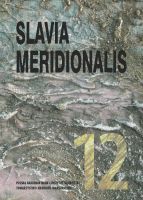Националните митови во современа Европа и негирањето на македонскиот идентитеm
National myths in modern Europe and denial Macedonian identity
Author(s): Nada ProevaSubject(s): Cultural Essay, Political Essay, Societal Essay
Published by: Instytut Slawistyki Polskiej Akademii Nauk
Keywords: Republic of Macedonia; FYROM; national identity; the so-called name issue; European Union; national myths; archaeology; history
Summary/Abstract: The independence proclamation of the Republic of Macedonia in 1991 provoked ardent reactions and denials by its neighbours, against the fact that she was the only peaceful actor in the Yugoslavia’s dissolution. The first negative reactions and denials came from the Southern Neighbor, whose denial was directed towards the name, i.e. the identity, while the others referred to the language, identity and even a part of the territory. The most vociferous and at the same time the most successful was the reaction of the Southern Neighbour, who gained support of the European ‘democrats’, which de facto turned them into accomplices in the open blackmail that demanded the Republic of Macedonia to change its constitutional name. Namely, the 1992 Lisbon Declaration of the E(uropean) C(ouncil) imposed a demand to the Republic of Macedonia to accept any name that would not contain the word “Macedonia” in order to be recognized by the EU!?! The newly independent state was finally admitted to the UN under a reference “the former Yugoslav Republic of Macedonia” through violation of the provisions of the UN Charter. Twenty years later the country is still enforced to use the offensive reference, and often even to tolerate the FYROM acronym. This article deals precisely with the politics of pressures and blackmail exercised by NATO and EU with regard to the so called name dispute. It also centers on national myths that are used in order to “justify” such politics and on the attitude of the European ‘democrats’ towards those national myths. In contrast to the democratic rules preached by NATO and EU across the world, the Republic of Macedonia was and still is blackmailed by an unprincipled demand to select a NEW name in order to please one member-state. As a consequence of that demand, the national myth linked with ancient Macedonians (so-called antiquisation, although the better term is antique-mania) has been revived and upgraded. A number of pseudo-historians with various professional backgrounds, such as journalists, politicians, writers, physicians, and even university professors, has involved in this endeavor. To make things worse, even some historians and archaeologists may be seen in this group, with a mission to defend the right to the name and identity. The societal climate has been politicized to such a degree that not only the neighbours, but even EU has been caught in the vicious circle of competing and mutually exclusive national myths. The Union obviously insists on the philhellenic myth i.e. on the alleged Hellenic roots of the European culture as such.
Journal: Slavia Meridionalis
- Issue Year: 2012
- Issue No: 12
- Page Range: 107-158
- Page Count: 52
- Language: Macedonian

